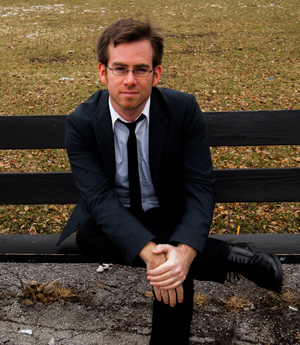by Mike Telin

What was the inspiration for the work’s intriguing title, de/ter| |ior.ation? Buchanan said it had to do with the piece’s relationship to his multimedia opera-in-progress, Hunger, which addresses the themes of self-destruction and psychological decay of rationality. “I was so deep in the world of these themes, that when I was asked to write the piece for BlueWater, it seemed appropriate to realize those themes in a purely instrumental way. I see the piece as almost a phantom overture that doesn’t play a role in the performance of the opera, although they are closely intertwined.”
Buchanan explained that there are many aspects of the piece that relate to the subject of deterioration. “It begins with a pulsating element in the strings which gradually breaks down. At the end, the music is controlled through a series of events of indeterminate length. It also breaks down in terms of pitch.”
The role of pitch in Western contemporary music is of great interest to Buchanan. “I’m not intent on destroying or removing pitch from my music, but I do think that other musical parameters deserve equal value — things like timbre, density and rhythm, and I think a lot about how to bring these elements to the foreground.”
In order to achieve the breaking down of pitch during de/ter| |ior.ation, the performers will be required to employ a number of extended techniques. Buchanan has gone so far as to included URLs in the score so that the musicians can link to videos which provide examples what he intends. One video that was made public reveals how a Styrofoam cup will figure into the mix. “The only additional object that is used is the Styrofoam cup, but it is used in many different ways by the string players. For example, they use it to play the instrument in odd ways. The headjoint of the flute is removed and played in various ways, as are the mouthpiece of the clarinet and the reeds from the oboe, English horn and bassoon, so everything eventually becomes disembodied.”
Buchanan said he looks forward to conducting the roughly ten-minute piece. “It will be interesting to see what happens in the rehearsal — what feels right and how the musicians respond.”
The commission from BlueWater Chamber Orchestra was part of the prize package Buchanan received as the winner of the 2014 Iron Composer competition. “It was an interesting experience. I wasn’t sure what to expect. On the morning of the competition they reveal the instrumentation that you will be writing for (in his case, a low sting trio) and the secret ingredient (a recorded sound map of downtown Cleveland), which we were instructed to integrate into the piece. The first thing I did was listen to the recordings and figure out how to produce those sounds on the acoustic instruments in a way that would complement the recordings. It was a very stressful process. You had five hours to write a piece that would be broadcast live on the radio after only fifteen to twenty minutes of rehearsal time. It was enjoyable and obviously I was happy with the result.”
That competition’s secret ingredient played into Buchanan’s strengths as a composer because of his experiences with the [Switch~ Ensemble], which is in residence at the Eastman School of Music’s Computer Music Center. Founded at Eastman in 2012, the ensemble has played a pivotal role in Buchanan’s quest to develop ways of seamlessly integrating an acoustic ensemble with electronics and multimedia platforms.
“I want to write music that uses the technology in ways that break down the technological barriers that prevent composers from producing interesting works. One way of achieving this was to create an opportunity for composers to work with an ensemble — rather than the standard system of writing the score, then producing the electronics and seeing what happens at the first rehearsal. I think a lot of electroacoustic music is somewhat lacking because the technology is still quite primitive, although it is far more advanced than it was in the 1980s. But we still have a long way to go.”
For his opera Hunger, Buchanan said that he developed software that is very flexible and allows the composer to make rapid adjustments and tweaks during the rehearsal process, which results in a more seamless integration of the acoustic with the electronic. “The challenge of working with electronics is that you never know until you get to the rehearsal how the sounds react to one another and how the ensemble responds to the electronics. Especially when you introduce live processing things can get complicated very quickly. The members of Switch are wonderful people and excellent musicians, I’m just happy to be surrounded by them.”
On May 15 Buchanan and the [Switch~ Ensemble] will travel to New York City for the premiere of Part III of Hunger on the MATA Interval 8 Series. “It’s an exciting project that I’ll be working on for the next year. I have a residency in Norway in the fall, so I’m hoping to complete the rest of the opera while I’m in Bergen and then work with Ensemble Interface to produce the entire opera in 2016-2017.”
Published on ClevelandClassical.com May 5, 2015.
Click here for a printable copy of this article


